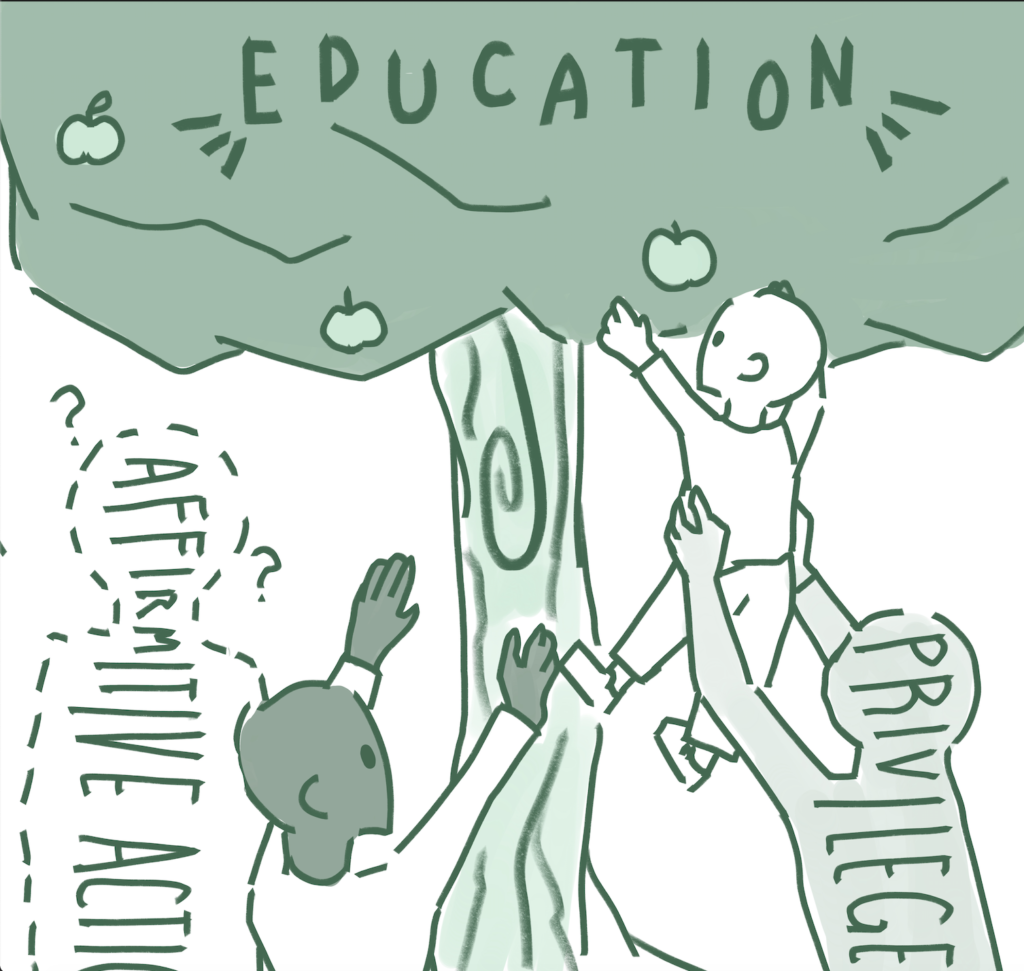
On June 29, the Supreme Court ruled 6-3 in Students for Fair Admissions (SFFA) v. Harvard and SFFA v. University of North Carolina at Chapel Hill that race-based affirmative action in college admissions is a violation of the 14th Amendment’s Equal Protection Clause. Affirmative action is the deliberate allocation of employment or educational opportunities to disadvantaged groups.
Initially established in the 1960s, affirmative action sought to bring equitable opportunities to college admissions.
“I think affirmative action serves to level the playing field when it comes to college admissions,” said senior Abigail Lee. “So I think admissions officers tend to be more lenient towards students who are of a race that is underprivileged in America.”
For some, the Supreme Court decision left a negative impression.
“I was really upset,” Lee said. “I felt the same way I did when they overturned Roe v. Wade — like we were going back in time. I understand that affirmative action wasn’t perfect, and a lot of people had problems with it, but it … was progress [in] the right direction.”
However, others agreed with the ruling.
“I don’t think race should be a consideration,” said junior Steven Dominguez. “It’s not fair if you’ve spent your whole high school career working hard for a college, only for them to say that you won’t be [admitted] since you aren’t a certain skin color. I think you should be [judged] on what you’ve accomplished, rather than what the color of your skin is.”
It’s not fair if you’ve spent your whole high school career working hard for a college, only for them to say that you won’t be [admitted] since you aren’t a certain skin color
Senior Varsha Jawadi reflected on her initial reaction.
“I have to admit, I was a little bit relieved because [as] an Asian American myself … I felt like I could understand where [the plaintiff] was coming from,” Jawadi said. “[I’m] someone who also tries really hard academically and puts in a lot of effort to get into prestigious colleges. So I was happy in that sense.”
Some have seen their opinion evolve. Jawadi elaborated on how she changed her stance after additional consideration.
“Once I did more research on it, I decided to take a neutral stance on it,” Jawadi said. “I do feel for a lot of the people that are negatively affected by [it, but] it’s true that [certain] racial groups in America don’t get the same educational opportunities, and it’s helpful to have [affirmative action] … because otherwise it’s just not fair to them.”
Dominguez’s understanding has also shifted.
“I used to see it [in a] black-and-white [way]; that it’s bad,” Dominguez said. “Now, I can see why colleges sometimes do it… Especially when segregation was still legal, it helped… minorities… It was an attempt to right a wrong. I think nowadays though, there’s a lot more equality, and… everyone has a pretty equal opportunity, assuming you put in the work.”
Lee elaborates on how her opinion has evolved, especially as an Asian American.
“When I was younger, all people told me was that [affirmative action] made it harder for Asian students to get into college,” Lee said. “So that being all I knew, I was like, ‘Okay, well that sucks.’ But once I learned more about it, I realized that there was a very good reason that [affirmative action was] in place; there are systemic injustices built into American society, and there isn’t a lot we can do [to fix it] quickly.”
However, Lee sees affirmative action as a remedy to this issue.
Why does the U.S. tend to hoard advantages in only a handful of elite institutions?
“[Affirmative action] helps people who are born in underprivileged neighborhoods and don’t have access to good education — which tends to correlate with race, whether people like to admit it or not,” Lee said.
Some believe that the concept of affirmative action should extend beyond race.
“We should transition to [an] economic-based affirmative action [system],” said junior Andrew Huang. “We should, no matter what race, help the people [from] the lowest socioeconomic statuses. That’s what I believe.”
For Modern World History teacher Scott BonDurant, affirmative action is only one aspect of a broader concern.
“The bigger issue before we even get to affirmative action in college admissions is: why is it even necessary?” BonDurant said. “Why does the United States in particular tend to hoard resources and advantages in only a small handful of elite institutions? That is more problematic to me than anything else.”
He elaborates on the sociocultural element of competitive college admissions.
“We’ve created this social incentive [to go to prestigious institutions] … [and] if [we] eliminated [it], then people wouldn’t be fighting each other,” BonDurant said. “We have bigger systemic issues around, organizations like the College Board, which are deeply problematic. There should be no such thing as a billion dollar nonprofit.”
This year’s college admissions cycle will mark the first since the 1960s without affirmative action.



